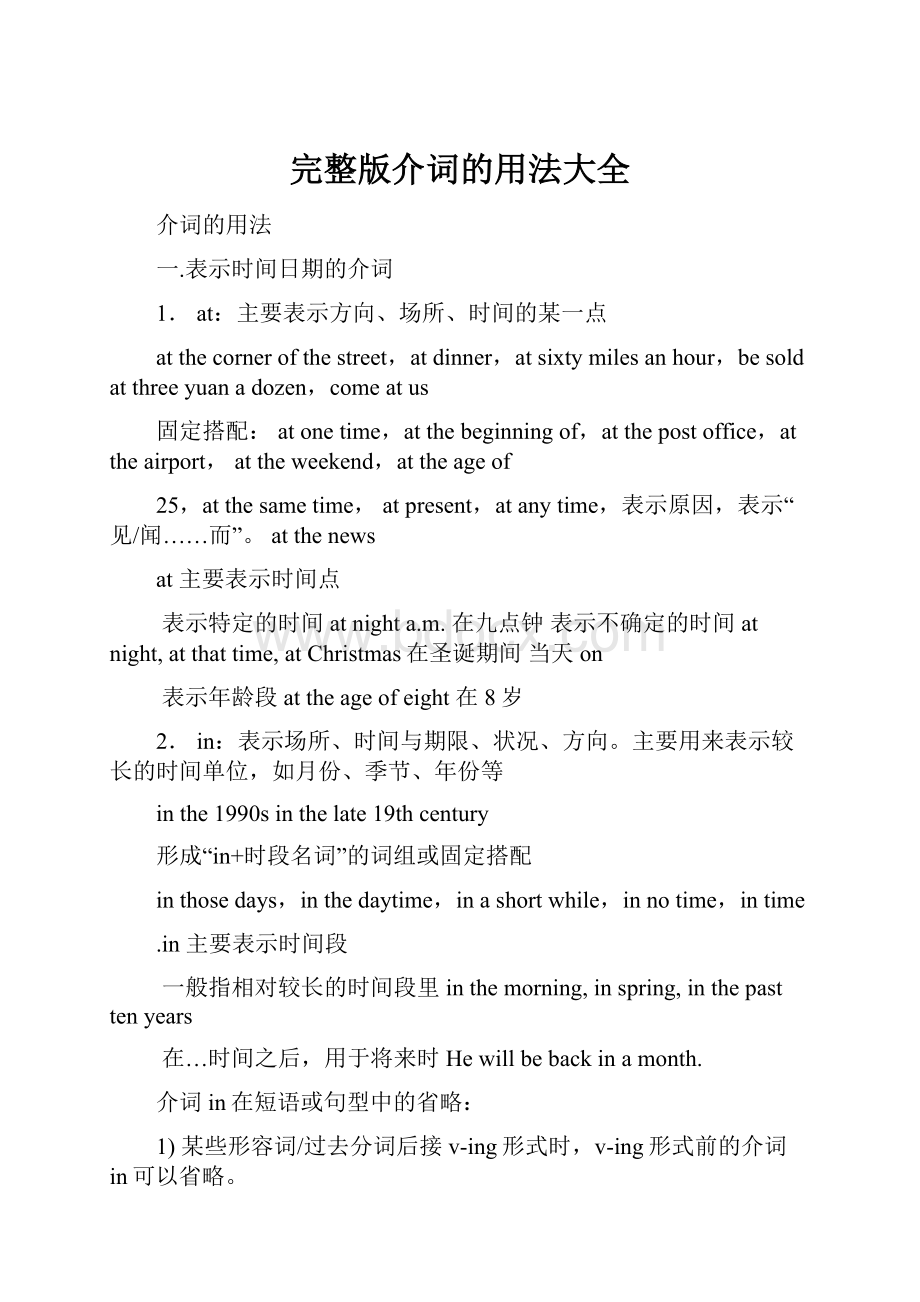完整版介词的用法大全.docx
《完整版介词的用法大全.docx》由会员分享,可在线阅读,更多相关《完整版介词的用法大全.docx(25页珍藏版)》请在冰豆网上搜索。

完整版介词的用法大全
介词的用法
一.表示时间日期的介词
1.at:
主要表示方向、场所、时间的某一点
atthecornerofthestreet,atdinner,atsixtymilesanhour,besoldatthreeyuanadozen,comeatus
固定搭配:
atonetime,atthebeginningof,atthepostoffice,attheairport,attheweekend,attheageof
25,atthesametime,atpresent,atanytime,表示原因,表示“见/闻……而”。
atthenews
at主要表示时间点
表示特定的时间atnighta.m.在九点钟表示不确定的时间atnight,atthattime,atChristmas在圣诞期间当天on
表示年龄段attheageofeight在8岁
2.in:
表示场所、时间与期限、状况、方向。
主要用来表示较长的时间单位,如月份、季节、年份等
inthe1990sinthelate19thcentury
形成“in+时段名词”的词组或固定搭配
inthosedays,inthedaytime,inashortwhile,innotime,intime
.in主要表示时间段
一般指相对较长的时间段里inthemorning,inspring,inthepasttenyears
在…时间之后,用于将来时Hewillbebackinamonth.
介词in在短语或句型中的省略:
1)某些形容词/过去分词后接v-ing形式时,v-ing形式前的介词in可以省略。
bebusy(in)doingbeengaged(in)doing(忙于……)
2)某些动词如busy等,常与反身代词连用,其后的in也可以省略。
busyoneself(in)doing
3)某些动词如spend、pass、waste等与表示时间的名词连用,后面的介词也可以省略。
spendtime(in)doingwastetime(in)doing
4)在havenodifficultyindoingsth.、havenotroubleindoingsth.、havenobusinessindoingsth.等句型中介词也可以省略。
5)在句型Thereisnouse(in)doingsth.中,介词也可省略。
固定搭配:
intheworld,in(the)future,inthesnow/rain/storm,inink,inshort,inpublic,inone'sopinion,inmoderntimes,insurprise,inaqueue,intheopenair
3.on:
主要表示在上面、根据或基础、有关或涉及的方面、表示某天。
固定搭配:
ondoingsth.,ontheafternoonofOctober,onTuesdayevening,onfoot,hitsb.onthehead,ontheright/left,onfire,onduty,onsale,ontheradio,onshow,onearth,onone'sown
注意:
一般带有宗教色彩的节日名词前面用at,如圣诞节。
一般的节日名词前用on。
on主要指具体某一天
st,1949.onmybirthdayonMonday,onOctober1表示是具体的日期和星期
某一天特定的上午下午或半夜onthenightofDecember31,1999.onafineday
在第几天onherfirstdaytoschool,onthetenthdayIwasinBeijing.
4.by主要表示接近、时限、动作的执行者、方式。
固定搭配:
bythevillage,byoneself,byfoot(=onfoot),byhand,learn…byheart,
二.表示地点,方位的介词
5.for主要表示目的、原因、交换值以及时间和距离的长度。
固定搭配:
makesth.forsb.,thanksb.forsth.,forexample,forsale,forfree,
for表示一段时间
表示一件事延续的长短,一般接具体的时间IhavelivedinNanjingfor2years.
6.of表示部分与全体的关系、所有关系、来源和所用的材料。
of所有格表示的多种关系:
1)从属关系:
thewheelofthecar
2)局部----整体关系:
someofthewater
acupoftea
量化关系:
)3.
4)描述关系:
aprofessoroflearning(知识丰富的教授)
5)同位关系:
thecityofBeijing
6)动宾关系:
thestudyofthemap(研究地图)
7)主谓关系:
thedeterminationoftheworkers(工人们的决心)
固定搭配:
befondof,makefunof,betiredof,ofone'sown,insteadof,
7.to主要表示方向、程度、结果、关系和位置。
固定搭配toone'ssurprise/joy/astonishment,totheeastof,keyto…,comeupto,addupto,beopentothe
public,thanksto,stickto,referto
8.during表示一段时间
在…期间内,强调在此期间内发生了什么事y
Istudiedinthisuniversityfor4years,duringthattimemostofmytimewasspentinlearningEnglish.
可接表示时间延续一段时间的名词duringmyvisittoChina,duringmyholiday
9.from与to,till连用
Mostpeopleworkfromninetofive.多数人过着朝九晚五的生活
10.since,since+时间点从那一刻起,与现在完成与过去完成时连用
HehasbeenheresincelastSunday.自从上星期天起,她就在这里
四、容易错、常考的介词及搭配
1.bemadeof,bemadefrom,bemadeinto,bemadein
2.callon=visit,callfor=goandpickup
3.onbusiness(出差)/strike()罢工/duty(值日)/holiday/fire/vacation/watch(警戒)/sale(出售)/leave(请假)/guard(警戒)
4.havesometrouble/difficulty(in)doingsth.,haveahabit/idea/planofdoingsth.
5.AispleasedtoB,BispleasedwithA(对……感到满意)
7.withthehelpof,undertheleadershipof
8.bymeansof(使用),bywayof(经由),byheart(记住),bytheway
9.outofquestion(毫无疑问),outofthequestion(毫不可能)
10.prevent/stop/keepsb.fromdoingsth.
11.bethankfultosb.forsth.
12.stealsth.fromsb.,robsb.ofsth.
13.insistondoingsth.,persistindoingsth.,stickto,goondoingsth.
14.setaboutdoingsth.,setouttodosth.
15.looksb.intheface,hitsb.ontheface,leadthecowbythenose
16.doafavourforsb.=dosb.afavour
五、介词的惯用型
1.aboveall(首先),afterall,atall(全然),inall
2.dayafterday,yearafteryear,oneafterone,oneafteranother
3.atpeace(和平),atwar(战争),attimes(时常),atdinner
4.byoneself,byallmeans(尽一切办法、务必),bychance,byaccident,
bynomeans(决不、并没有),bymeansof(用、依靠),bytheway
5.inherteens(十几岁),inpain,indanger,inneed
6.toone'sjoy/sorrow/surprise
7.withcare(仔细地),withjoy/pleasure(高兴地),withone'shelp,
withthebestwishes(致以我们良好的祝愿),withoutdifficulty(毫不困难地),withoutexception(毫不例外),withoutdelay(立即、马上)
8.accordingto(依据),alongwith(和……一起),asto(至于……),becauseof,exceptfor(除……之外),insteadof(代替)
9.outoforder(不正常),outofdate,outoftrouble(脱离困境),outofsight,
outofdebt(还清了债务),outoftouch(没有联系)
10.atthebottomof,atthecentreof,attheendof,atthetopof,
ataspeedof
,atthethoughtof,atthesightof为代价)……(以atthecostof
11.inmemoryof(纪念),infavourof(同意),inthehabitof(有……习惯),intouchwith(与……保持联系),ontheleftof,ontheeveof(在……前夕)
12.fromtimetotime(不时地),fromdaytoday(天天),fromhandtohand(一个传一个),fromside
toside(左右地),fromcartocar(一个车厢一个车厢地),frombadtoworse(越来越差),frombeginning
toend(从头到尾),fromhandtomouth(仅能糊口),fromheadtofoot,fromstarttofinish,fromonetoanother
六.掌握方式、手段、工具的表达方法
1)in+文字、语言、材料名词
inEnglish(ink,pencil,capitalletters)writeinpen,用钢笔写speakinalowvoice小声说话
2)with+工具、机器;人体器官;情绪、情感、态度的名词
withabranch,withone'snose,withpride,withsatisfaction,
withthehelpof,withone'spermission
Wecanseewithoureyesandwritewithourhands.
Ikilledaflywithaflyflap.我用苍蝇拍打死了一只苍蝇
3)by表示泛指的方式、手段
bybus,byland,bymeansof(用……方法),bywayof(经由),bydoingsth.,
byhand(手工),bypost(由邮局传递),byletter(用写信的方式),byelectricity,byhardwork,bytheyear,
bythehour(by+the+单位名词)按……
4)其它表示方式(情况、状况、手段)的表示法
throughtheradio/byradio/ontheradio,through/by/frompractice,
bytelephone(onthetelephone),onfoot,onthetrain,insatisfaction,insurprise,insilence,inalowvoice,in
comfort,insorrow,inhigh/good/poorspirits,
inanger,insafety,indebt,ingoodorder,ingood/poorhealth,intears,
inuse,inpain,
七、注意:
某些名词和介词的固定搭配
1)要求to:
key,answer,visit,apology,introduction
以to为中心构成短语的归纳
belongto,cometo(苏醒),lookforwardto,leadto,stickto,referto,turnto,drinkto(为……干杯),object
to(反对),replytotheletter,helponeselfto,sing/dancetothemusic(和着……在……声中唱/跳),devote
oneselfto
2)要求in:
interest,satisfaction
3)以for为中心构成短语的归纳
askfor,callfor(去接某人),carefor(关心),goinfor(从事),answerfor(对……负责),sendfor,pay
for,praisesb.for(赞扬某人某事),headfor(向……方向移动),searchfor,take…for…(误以为),leave
for,preparefor(为……准备),thanksb.for,makeadivefor(向……猛冲),makeupfor(弥补……损失)
4)以on为中心构成短语的归纳
comeon来吧,callon拜访,passon传递,carryon进行下去,liveonsth.靠……生活,dependon依靠,haveon穿着,havepityon同情,lookon…as…把……看作,pushon推动,spyon窥探,switch/turnon旋开,wait
on服侍,walkon继续走,spend…on…在……上花费时间、金钱,operateon给……动手术,takeonanew
look呈现新面貌
八、某些形容词和介词的固定搭配
1)beafraidof担心beafraidfor替……而担心
2)beangryabout/atsth.因……而生气beangrywithsb.对……某人发怒
3)beanxiousforsth.渴望beanxiousaboutsth./sb.担心
4)bedifferentfrom与……不同beindifferentto………不关心
5)begoodat…擅长begoodfor…对……有益begoodofsb.todosth.友好
6)bestrictwithsb.对……严格bestrictinsth.
7)bepopularwithsb.受到……欢迎bepopularinsomeplace流行在……bepopularfor因……而流行
8)bepleasedwith+n.或what从句;bepleasedat+抽象名词听、看到而高兴
9)bedisappointedatsth.;bedisappointedwithsb.对……失望
而著名……因beknownfor;或从句beknownwith+n.;beknowntosb.)10.
11)beabsentfrom缺席
12)bedevotedto…献身于……
13)beopento…对……开放
14)bepoor/clever/expertat…
15)besorryfor…替/为……后悔
16)berichin…beinterestedin…
17)beproudof(takepridein)
18)besatisfiedwith/by…besureof/about…
19)befondof,befitfor,bebusywithsth.(indoingsth.)
20)belatefor,bereadyfor
21)besimilarto…;bewrongwith…
九、吊尾介词
1)某些形容词后接不及物动词或“V+介”型短语动词的不定式形式表“反射”,常用吊尾介词。
A)fit,easy,hard,good,difficult,comfortable,heavy等形容后,常用吊尾介词。
e.g.Thegirliseasytogetalongwith.
B)beworthdoing,beworthyofbeingdone,beworthytobedone,want/require/needdoing表反射,常用吊尾介词。
e.g.Theproblemisworthdealingwith.
Thebookisworthyofbeingreferredto.
2)不及物动词的不定式修饰表“涉及对象、场所、工具、手段、方式、材料等”意义的名词时常带吊尾介词。
e.g.Thereisnothingforustoworryabout.aroomtolivein
3)定语从句中,先行词被一个不及物动词所修饰,则不及物动词后要带介词,先行词被“V+介”组成的短语动词所修饰,介词常在句尾。
e.g.HeistheverymanIjustspoketo.Thisisthelifeheisusedto.
4)以what,whose,who,whatever等引导的宾语从句、表语从句中常出现“吊尾介词”。
e.g.Idon'tknowwhatyoudoitfor.
5)强调句型和特殊疑问句中由于被强调部分和疑问词位置变更,常出现吊尾介词。
在上下文意义清楚时,特殊疑问句常用省简结构。
e.g.Itisthepoorboythatwegavethebooksto.
Whatfor?
(为什么?
)Whereto?
(去哪儿?
)Whowith?
(和谁去?
)
6)被动语态中“V+介”短语常用吊尾介词。
e.g.Hewaslistenedtocomehere.Hehasneverbeenspokentointhisway.
十常用介词辨异
1.about,on,of关于
on多用于慎重的、正式的语言交际场合。
常见于“学术上”的“论文”或“演说”等题目,可供专门研究这一问题的人阅读,有“论及”之意。
about表示的内容多为普遍、不那么正式,有“述及”之意。
of作“关于”讲,表示提及、涉及某人(事)时,只表示事情存在或发生,并不涉及详情;有时与about意义相近,但有时意义很不同,常与动词know、hear、learn(听说)、speak、talk、think、tell等连用。
2.at,on,in(表时间):
at表示时间的一点;in表示一个时期;on表示特殊日子
A.at后常接几点几分,天明,中午,日出,日落,开始等。
如:
atfiveo'clock(五点),atdown(黎明),atdaybreak(天亮),atsunrise(日出),atnoon(中午),atsunset(日落),atmidnight(半夜),atthebeginningofthemonth(月初),atthattime(那时),atthatmoment(那会儿),atthistimeofday(在一天的这个时候)。
B.in后常接年,月,日期,上午,下午,晚上,白天,季节,世纪等。
如:
in2006(2006年),inMay,2004(2004年五月),inthemorning(早晨/上午),intheafternoon(下午),intheevening(晚上),inthenight(夜晚),inthedaytime(白天),inthe21stcentury(21世纪),inthreedays(weeks/month)三天(周/个月),inaweek(一周),inspring(春季)。
.
中、晚\即具体某一天极其早,后跟某日,星期几,某日的朝夕,节日等C.on
onSu